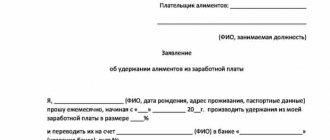1
Receiving financial support for a child as soon as possible is the cherished dream of many parents with whom the child remains after a divorce. When turning to the courts for help in collecting alimony, the applicant parent expects a speedy consideration of his claim and the issuance of a writ of execution upon request.
The timing of consideration of an application for alimony depends on a number of factors, including:
- Method of recovery: court order or lawsuit;
- The presence of additional requirements, in addition to alimony;
- The position of the defendant, his avoidance of appearing in court or opposition to the consideration of the case;
- The position of the plaintiff, the timeliness of his notification to the court about the impossibility of appearing at the hearing.
Let's try to consider each of the options in more detail.
Consideration of claims
The time frame for consideration of a claim is determined in Art. 154 Code of Civil Procedure of the Russian Federation. If the dispute concerns alimony, then the decision must be made before the expiration of a month from the date of commencement of the proceedings. If, together with demands for alimony, another controversial issue is resolved (dispute about the place of residence of children, division of joint property), then the period of consideration will be: 1 or 2 months, depending on whether the magistrate or district court, respectively, is conducting the proceedings. At the same time, there are a number of other procedural actions.
- Filing a claim. If the document is prepared by a specialist, it will take no more than 2-3 hours. If you draw up an application yourself using the existing sample, it will take 1-2 days.
- Sending documents. The plaintiff can independently submit an application to the court or use the mail (in the latter case, the date of application is the day shown on the stamp). If documents are sent through a post office, then it is worth considering the time it will take to deliver the item. Mail mileage within the territory of one city can be 4-7 days.
- Acceptance of the claim for proceedings (Article 133 of the Code of Civil Procedure of the Russian Federation). To do this, the judge has 5 days from the date of receipt of the application. At the same time, its compliance with the legal requirements will be checked. If there are violations, the claim will be left without progress or without consideration. In such situations, the applicant must correct the comments and apply again.
- Dispute resolution. The case cannot be considered for more than a month or 2 (in the cases described above) from the date the application was accepted for proceedings.
There are a number of circumstances that can significantly increase the period of proceedings. An example is the need to conduct a genetic examination, when in one dispute the issue of establishing paternity and assigning alimony is resolved. Guided by Art. 216 of the Code of Civil Procedure of the Russian Federation, the judge has the right to suspend the proceedings until the results of laboratory tests are received. The period during which the case must be considered is also suspended.
Why does it take a long time for an application for alimony to be processed?
The prompt consideration of an application for alimony in court is often hampered by the following circumstances:
- The defendant's unwillingness to appear in court. The hearing may be postponed up to 3 times due to the absence of the other party.
- New circumstances contributing to a change in the jurisdiction of the case.
- The need to search for evidence and conduct an examination.
- Request by one of the parties to reschedule the hearing.
- Filing a counterclaim, without consideration of which it is impossible to make decisions on alimony.
- Appealing a court decision. The defendant has the right to express disagreement with the decision and file an appeal. The validity of the writ of execution is suspended during the appeal.
Example
On May 31, 2020, citizen S. filed a claim in the magistrate’s court for the recovery of alimony in the amount of 1/4 of citizen K’s earnings. The meeting was scheduled for June 14, but her husband did not appear and did not notify him of the reason for his absence. The rehearing took place 10 days later, on June 25. The husband came, but filed a counterclaim to determine the child’s place of residence. The magistrate made a determination to transfer the case to jurisdiction and sent it to the district court. The case was sent to the records management department for processing.
The meeting was scheduled for July 10. Since determining the child’s place of residence required the involvement of the guardianship and trusteeship authorities and a psychologist, the case was suspended for a week (based on Article 216 of the Code of Civil Procedure of the Russian Federation). The guardianship and trusteeship authorities examined the child’s living conditions, interviewed witnesses and issued an opinion on July 17, 2020. A new hearing was scheduled for July 31.
Based on the data received, the court decided to leave K.’s claim without satisfaction, that is, the child remained to live with his mother. As a result, alimony was awarded in the amount of ¼ of K’s salary. In fact, the trial lasted 2 months.
Further time costs
Having withdrawn the completed decision, the plaintiff will not be able to immediately receive the alimony due. The defendant is given a month from the date of the judicial act to appeal it. If he does not exercise this right, then after the period of contestation has passed, the claimant will be able to obtain a writ of execution and apply to the FSSP.
When a complaint is filed and is considered by the appellate court, additional time costs arise. The district or regional (regional, regional, republican) court must accept the complaint for proceedings and set a date for a hearing on it. The maximum period for appeal proceedings is determined by the rules of Art. 327.2 of the Code of Civil Procedure and is 2 months from the date of receipt of the application for reconsideration of the case. If the decision is appealed, the entry into force of the document may be delayed for more than 3 months.
If the defendant’s appeal is refused, the act adopted by the court will come into effect.
Terms and procedure for considering an application for alimony collection
Forced collection of alimony is possible in two ways - by claim or by order. There are many differences between them, which are best known in advance.
Claim proceedings
Claim proceedings involve filing a claim for the recovery of alimony with the court at the place of registration of the defendant, and if this is not possible, at the address of his registration.
The process looks like this:
- The plaintiff files a claim and accompanying documents. The judge has 5 days to accept the case for consideration. At this time, he determines whether the requirements of civil law regarding documentation and jurisdiction have been met. If the case is not considered by this court, the claim is returned to the plaintiff with detailed explanations of where to apply.
- Within 5 days, a ruling is made on the preparation of case materials for trial, if the judge is satisfied with the content of the documents and all legislative nuances are observed. The parties to the proceedings are sent notifications indicating the date of the first meeting.
- In Art. 154 of the Code of Civil Procedure of the Russian Federation states that cases of alimony collection are considered for no more than 1 month. This time is given to the judge to make a decision.
- Based on the results, the operative part of the decision is announced and a writ of execution is drawn up.
You have 1 month to appeal the decision, after which it enters into legal force and is transferred to the bailiffs for execution. The claimant may apply with a writ of execution to the organization at the payer’s place of employment.
Learn more about withholding child support at your place of work.
The decision is implemented without delay, but the right to challenge remains with the parties to the proceedings. The plaintiff must independently contact the bailiffs or the accounting department at the defendant’s work address with the document and IL. Without this, payments will not be transferred.
Order proceedings
The legislation of the Russian Federation provides for a simplified procedure for collecting alimony - writ proceedings:
- The claimant sends an application to the court for the issuance of a court order. This can be done at any time during the period of validity of the grounds for collecting funds.
- The judge draws up an order within 5 days, the assistant or secretary notifies the claimant and the debtor about the execution of the document.
- The claimant takes the order, and a copy of it is sent by the court to the payer.
- The alimony obligee has the right to appeal the document within 10 days from the date of registration by sending a corresponding objection.
After the objection is accepted, alimony is assigned through a claim procedure. The execution of the order is relevant if there is no dispute about payments between the parties.
A court order is equal in legal force to a writ of execution. The claimant has the right to present it to the bailiffs, accountant, or agree with the alimony obligee on voluntary payments.
If the payer transfers money independently for some time, and then payments stop being received, a penalty begins to accrue - 0.1% of the amount owed for each day of delay. To collect a debt, it is enough to present an order and bank statements, where the date of the last transfer will be visible.
What nuances are important to consider:
- If the payer has alimony obligations to a third party, an application for an order is not submitted. The assignment of payments is only available by filing a claim, since the participation of the other party in the proceedings may be required. You cannot submit an application if the child support holder is already paying money to support another child.
- When the debtor files a reasoned objection to cancel the order, the judge does not have the right to refuse. The claimant in such a situation does not have the right to re-apply with a similar application - he must file a claim.
Important! It is recommended to file an objection to a court order in person or remotely using online services. By resorting to the help of Russian Post, you can skip the deadline for appealing. Even if the payer is not at fault, it is problematic to restore them.
Simplified proceedings
In order to reduce the time spent on proceedings, the Code of Civil Procedure of the Russian Federation was supplemented with Chapter 21.1 on simplified proceedings. Compared to a regular trial, the following features are provided:
- making a decision without calling the parties;
- production of a truncated version of the judicial act;
- reduction of the time limit for appeal to 15 days.
The listed benefits cannot be realized if the dispute concerns alimony. Part 3. Art. 232.2 of the Code of Civil Procedure of the Russian Federation directly prohibits the use of such a procedure in cases that affect the rights of children.
Examples
To understand in detail the timing of the start of payments, it is enough to familiarize yourself with practical examples:
Collection through the FSSP
The IL was received on May 15 and presented to the bailiffs the next day. On May 18, enforcement proceedings were initiated. The debtor is given 5 days for voluntary repayment - until May 23 inclusive.
He did not comply with this requirement, the IL was submitted to the accounting department of the organization at the place of work of the alimony obligee.
Collection through accounting
The woman received the IL on April 10 and presented it to the accounting department of the enterprise at the payer’s place of employment on April 11. Salaries are paid in two installments - every 15 days - on the 16th and 30th (31st).
The first accrual was made on April 19, since the accountant has 3 days from the moment the salary is transferred to pay alimony.
Obtaining a court order
An alternative to a simplified dispute resolution procedure is the execution of a court order. Let's figure out how long it takes to consider an application for alimony in writ proceedings.
According to Art. 126 of the Code of Civil Procedure of the Russian Federation, a court order is issued within 5 days after the application for its issuance is served. The document will become valid under the following conditions:
- it is delivered to the debtor;
- the defendant did not file an objection to the collection 10 days after receiving the order.
To the time required for the document to come into force, it is necessary to add the mail mileage period, which is within 2 weeks.
The disadvantage of writ proceedings is the ability of the defendant to cancel the issued act unconditionally. In such a situation, the consideration of the alimony case will be carried out according to standard rules. As a result, the time frame for making a decision will increase by 2-4 weeks (if the statement of claim takes a long time to be drawn up and sent, the collection process will be further delayed).
Legislation
Content
From a legislative point of view, the specifics of collecting alimony are regulated by the Insurance Code, the Civil Code and the Code of Civil Procedure of the Russian Federation. The Procedural Code determines the procedure and deadlines for accepting documents and considering the case. The latter depends on the type of proceedings - claim or writ.
In the Russian Federation, there is a simplified procedure for collecting alimony by filing an application for a court order. It is convenient because the presence of the parties is not required to make a decision.
The type of proceedings also matters for the order of consideration. The result is the execution of a court document, on the basis of which the collection of funds is made.
Citizens can draw up an alimony agreement at any time. In this case, no legislative deadlines are established. The payer and recipient independently decide on the frequency and amount of payments.
When will cash flows begin?
Additional time costs are associated with contacting the FSSP or the accounting department of the enterprise where the payer works.
If the writ of execution is presented to the employing company, then the transfer of alimony will begin with the next payment of earnings. The funds must be sent to the child within 3 days after the reward is issued.
When a claimant acts through the FSSP, he needs to take into account a number of procedural deadlines:
- the period for transferring the writ of execution to the bailiff is 3 days;
- initiation of enforcement proceedings, carried out within 3 days after the official receives the materials;
- providing the debtor with a 5-day period for voluntary payment (the period begins to be calculated from the date of delivery of the decision to open enforcement proceedings).
The bailiff will be able to begin forced collection no earlier than in 2 weeks, taking into account the mileage of the mail.
How long should I wait for money?
After the writ of execution has been received by the bailiffs or the employer, the execution of the judicial act begins.
How long to wait for alimony if it is collected through bailiffs? Here are your deadlines:
- 3 days to initiate enforcement proceedings;
- 5 days to give the debtor a chance to fulfill the obligation voluntarily.
Then, enforcement measures are applied: seizure of accounts and property, restrictions on rights, etc.
When should I expect the first alimony payments from the payer’s employer? The employer is obliged to withhold money for the maintenance of a minor from the salary of his parent on a monthly basis, within 3 days from the moment the funds are issued to this employee.
However, cases are different. It happens that the debtor evades collection and it is difficult for the bailiffs to do anything. It happens that the employer transfers funds late or does not transfer them at all.
Rules for determining time costs
When determining the time costs for collecting alimony, it is recommended to proceed from several rules.
- Order proceedings allow you to achieve the fastest resolution of the issue. This method is effective only if there is no dispute about alimony. If there is one, then filing an application for a court order will only delay the proceedings.
- The standard procedure for collecting funds for child support cannot last more than a month. This does not take into account various actions preceding the acceptance of the claim for consideration and associated with appealing the decision.
- Simplified proceedings in alimony cases are not possible.
- Collection of alimony through the FSSP will begin no earlier than 2 weeks after the application.
Knowing the listed features, the parent will be able to choose the most appropriate way to achieve payments.
How to quickly file alimony in court?
The only way to expedite the consideration of an application for alimony is to apply to the Magistrates' Court for a court order. It is not necessary to notify the other half about this, but there is a possibility that the spouse will file an objection, then receiving alimony will be possible only through a court hearing. It is better to notify your spouse of your intentions in advance and reduce the likelihood of receiving a refusal.
When third parties are involved in the process, registration of alimony through writ proceedings is impossible. To speed up the trial process it is necessary:
- Correctly draw up a claim and prepare a package of documents.
- Make sure that the payer received the summons, and if not, hand over the document to him personally or to another person living with the defendant, in the presence of witnesses.
- If there is information that the alimony provider will not appear in court, ask him to file a petition to consider the case in his absence. This way the meeting will not be postponed for an indefinite period.
- If you are not present at the meeting, issue a power of attorney to represent the case in court. Choose a family dispute resolution specialist as your attorney.
- Do not group several claims in one statement of claim. Dispute resolution will be delayed if the issue of divorce, division of property and other claims need to be resolved at the same time. The law allows for the filing of one claim with several petitions, but it is recommended to file a claim for alimony separately.
These actions will not force the judge to quickly set a hearing date or make a decision, but will help achieve a result in the shortest possible procedural time.
Results of the proceedings
In the deliberation room, the judge makes and signs a decision; at this stage, the parties can no longer help the judge make a decision. Then he reads out the operative part of the act, and the motivational part is prepared after some time.
The participants in the process are given a resolution; it must have a blue official seal on it. For the plaintiff, this document is important for collecting alimony in the future, and the defendant, on the basis of this document, has the right to appeal to a higher authority to appeal the decision. The final decision of the court, provided that the parties were not present in the courtroom, is sent by mail.
You can appeal the court decision via appeal within a month. An objection to the court order must be filed within 10 days.
Need a lawyer
If you need advice on the timing of consideration of cases of alimony collection and you doubt the legality of the court delaying the collection of funds for children, contact our lawyers right now. They will tell you what to do, what and where to write, and also predict the approximate real terms for collecting alimony in your case.
Therefore, contact our lawyer for a FREE consultation right now and get rid of problems in the future!
-free for a lawyer!
Ask a legal question and get a free consultation. We will prepare an answer within 5 minutes!
All data will be transmitted over a secure channel
Fill out the form and a lawyer will contact you within 5 minutes
A parent who goes to court for child support is always interested in the answer to the question: how long will it take to consider the application, how soon will it be possible to receive the first cash payments?
Family law establishes that the accrual of monetary payments begins from the moment the application is submitted to the judicial authority, regardless of how long it will take for the court to consider it. But receiving payments will become possible only after a court order or writ of execution is issued based on a court decision.
Establishing paternity: when is child support paid?
In some situations, a declaration of paternity may also include a request for child support. If the court establishes a family relationship, payments will also be withheld from the date the claim is filed.
If alimony claims were not made in the paternity claim, you must first obtain a court decision confirming family ties. Only then apply for recovery of funds for the child and attach a court decision to establish paternity. From this moment the collection of payments will begin.
If you are interested in the question of how to return child support when challenging paternity, read this article.
Deadlines for receipt of alimony after filing a writ of execution with the bailiffs
Sometimes, in order for the alimony payer to start paying alimony on his own, a court decision is enough. But, more often, in order for money to start flowing from the debtor, an appeal to the bailiffs is required.
In order for the bailiff to begin enforcement proceedings, the claimant must provide him with a writ of execution and a statement. Within three days from the date of receipt of these documents, the bailiff is obliged to issue a resolution to initiate enforcement proceedings or refuse to initiate them.
After the start of the proceedings, the bailiff sends requests to various authorities and organizations to determine the debtor’s place of work, his earnings, as well as the money and property he has. If the debtor works under an employment contract, then the bailiff sends documents to the organization in which he works to withhold and transfer money from the debtor’s salary to the recipient. The approximate time frame for the start of receiving money in such a situation is 2 months.
However, the debtor does not always have any income, money or property. In some cases, you may not even have to wait for funds to arrive.
Often, avoiding the need to pay child support, the payer goes into hiding and hides his property. In such situations, the bailiffs, on their own initiative or at the request of the claimant, may begin efforts to search for the debtor or his property. And if such a search is not successful within a year, the claimant acquires the right to have the debtor declared missing through the court.
Grounds for calculating alimony
Child support money is withheld based on:
- agreements;
- court decision.
An application for alimony can be filed during the marriage, during the divorce process, and also after the divorce. Most often, a demand for recovery is filed simultaneously with a claim for divorce.
We described in this article how to collect alimony under a writ of execution. What you need to consider when concluding an alimony agreement, we described here and here.
Appealing a court decision
After the court decision is issued, the parties to the proceedings are given a month to appeal, but execution is possible immediately after the plaintiff receives the document. Challenging during this period is carried out by filing an appeal with the body that made the decision, but the complaint is subsequently transferred to a higher court.
If the appeal is filed directly to the appeal board, the documents are forwarded to the judicial body whose decision is being challenged (Article 321 of the Code of Civil Procedure of the Russian Federation).
According to Art. 329 of the Code of Civil Procedure of the Russian Federation, the appeal ruling comes into force immediately after its issuance.
If the deadline for appealing a court decision is missed, the procedure is carried out only through the cassation procedure. In Art. 382 of the Code of Civil Procedure of the Russian Federation states that cassation in an unclaimed case is considered for 1 month, in a claimed case – 2 months. The report begins from the date the complaint is received.
Basic information
Basically, child support obligations are established in relation to minor children whose parents divorced and began to live separately. Also, alimony is transferred to children who have reached the age of 18, for example, if they are unable to work and have a disability.
Alimony can be established for a spouse. A needy person has the right to financial support both during marriage and after its dissolution. Alimony can be established:
- disabled spouse;
- for the spouse until their common child is 3 years old or for the wife carrying the baby;
- a spouse who is caring for a common disabled minor child or a person disabled since childhood of group 1.
If the spouse’s incapacity for work is the result of alcohol/drug addiction, the commission of a crime, or unworthy behavior in marriage, then he will be denied alimony. The court will also reject the claim if the marriage lasted only a short time.
Additionally, parents of adult able-bodied children have the right to alimony. If in court it turns out that a parent in the past refused to raise and provide for his child and was deprived of parental rights, then he will be denied child support.
Finally, alimony can also be established for other family members - grandparents, brothers, sisters.
When can I expect cash payments?
Probably, parents are interested not so much in the duration of court procedures as in the timing of receiving the first cash payments to fully provide for all the needs of the child.
After making a decision or order of the court, you should contact the payer’s place of work or the local branch of the Bailiff Service (Bailiff Service) to directly implement the judicial act (see “Where to submit a court order for alimony”).
As for the deduction of funds from the alimony payer’s salary, it is carried out after submitting a writ of execution to the accounting department at the place of work . The first payment will be made from the employee’s next earnings (no later than 3 days) and then monthly.
If you have to resort to the help of bailiffs, then the following procedural deadlines are established in enforcement proceedings:
- 3 days - to open enforcement proceedings;
- 5 days - for voluntary fulfillment of alimony obligations, after which bailiffs apply compulsory collection measures, including seizure of property and money in bank accounts (see “Alimony and the bailiff service”).
Cash payments will be received either on the recipient's card, or they can be received by mail.
Briefly about the main thing:
- The deadlines depend on the chosen procedure: writ or lawsuit proceedings.
- It is easier and faster to obtain a court order to collect alimony. To do this, an application is submitted to the magistrate’s court, and after 5 days the court makes a decision. The downside is that the defendant can cancel the order (then it is not valid).
- Claim proceedings are longer and more complex, on average up to 3-4 months. However, alimony is collected from the moment the claim is filed with the court office.
- If the court makes a positive decision, a writ of execution is issued. It must be taken to the bailiffs or given to the accounting department at the defendant’s place of work.
- Collection of alimony occurs immediately. The first payments are from the father’s first earnings.
- If the payer evades paying alimony, the bailiffs can seize his property and accounts + charge additional penalties.
It is a mistake to think that collecting alimony is easy.
Hundreds of fathers evade payments, and mothers cannot receive child benefits. And largely due to ignorance of legal subtleties. The judicial system is partly to blame. Not all citizens can immediately understand the deadlines, procedures, claims, documents and state fees. Some people don’t want to go to court, and they try to influence their ex-spouse with entreaties and persuasion. This works extremely rarely. The only way to influence the payer is to go to court through an order or claim. Next, work with the bailiffs and demand payment of alimony. If you urgently need help, contact the lawyers of our portal. They know how to collect alimony, find justice for a defaulter, challenge a court order, file a counterclaim or a complaint about the inaction of bailiffs. A consultation will clarify your problem. Perhaps it can be resolved before trial. If not, the lawyer will tell you how to act for sure and not waste time on unnecessary actions. Ask, call - we will answer as soon as possible! Attention!
- Due to frequent changes in legislation, information sometimes becomes outdated faster than we can update it on the website.
- All cases are very individual and depend on many factors. Basic information does not guarantee a solution to your specific problems.
That's why FREE expert consultants work for you around the clock!
- via the form (below), or via online chat
- Call the hotline:
- Moscow and the Region
- St. Petersburg and region
- FREE for a lawyer!
By submitting data you agree to the Consent to PD Processing, PD Processing Policy and User Agreement.
Anonymously
Information about you will not be disclosed
Fast
Fill out the form and a lawyer will contact you within 5 minutes
Tell your friends
Rate ( 3 ratings, average: 3.00 out of 5)
Author of the article
Irina Garmash
Family law consultant.
Author's rating
Articles written
612
Duration of proceedings
The duration of the trial for claims for withholding alimony payments depends on the type of proceedings and the defendant’s intentions to appeal the claim.
Order proceedings
Collection of alimony payments by court order is carried out if:
- the parents have reached an agreement on the amount and procedure for paying child support;
- controversial issues concerning the child have been resolved;
- there is no need to establish or challenge paternity.
A request for a court order is sent to the court and considered without summoning the participants within 5 working days. Based on the results of the consideration, a court order is issued, which is sent to both participants.
Once the order is issued, the responding party has a 10-day period to appeal. If this does not happen, then the order gains legal force. In the event of an appeal, the court decision is canceled and the case is sent for trial by claim proceedings.
Claim proceedings
If there are disagreements, alimony payments are collected through the claim process. If the statement of claim and the documents accompanying it are drawn up correctly, then after 10 working days the participants are notified of the day of the first court hearing.
In accordance with part 2 of Art. 154 of the Code of Civil Procedure of the Russian Federation, cases of withholding alimony payments in favor of minors must be considered within 30 days.
Based on the results of the consideration of the case, a court decision is issued. It gains legal force 30 days after its formation.
During the designated period, the defendant can file an appeal.
If you want to find out how to solve your particular problem, please use the online consultant form below or call :
(for residents of St. Petersburg and the region)
Many alimony recipients ask the question: how long to wait for the first alimony after filing a claim? Some are mistaken in believing that funds begin to be collected from the day the court decision enters into force or from the moment of divorce. We will tell you when alimony actually begins to be withheld and how long the court process for claims in this category lasts.
Filing a claim
Required documents:
- child's birth certificate;
- marriage certificate (if available);
- divorce certificate (if available);
- passport;
- photocopy of the defendant’s passport (if available);
- a certificate stating the defendant’s income;
- statement of claim;
- a receipt indicating the fact of payment of the state duty;
- extract from the house register.
Applicant's actions:
- Prepare relevant documents.
- Draw up a claim in which you need to indicate the child’s data, details of the collected documents and indicate the amount that the applicant demands from the defendant.
- Make copies of all papers.
Note! The lawsuit is drawn up in two copies








